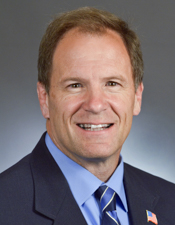Would local and county services improve with an incentive program?
Minnesota plans to disburse about $834 million in local government aid and county program aid around the state this year. But how much bang are the state’s residents getting for those bucks?
Rep. Paul Marquart (DFL-Dilworth) has an idea to find out.
HF2928 would create an incentive program under which cities and counties could increase the amount they get from the state if local residents set some specific performance goals and meet them. He calls it “a stronger community aid program.”
The bill was laid over Wednesday by the House Property Tax Division for possible inclusion in the division report to the House Taxes Committee. It has no Senate companion.
Marquart said there’s a program run by the Office of the State Auditor under which cities and counties can set performance goals and receive extra aid for achieving them. But he said the incentives are meager and participation is low, at about 4% of cities and 33% of counties.
He suggests raising the ante and hopes the result will be better services and more transparency. It would replace the current program with something similar, but add three key elements. The local and county units of government would be required to hold performance management meetings with citizens to talk about their budget process; would have to pick two measures to look at for strategic planning; and their amount of aid would be greatly enhanced.
“Government is a monopoly,” Marquart said. “So, if you live in a city or a county, those services are provided, and you can’t go elsewhere. In schools, we’ve implemented a bit of competition with open enrollment, charter schools, [postsecondary enrollment options] and so forth. But there’s no incentive for cities and counties to do better with their services. Your customers have to pay the same regardless of the quality of the services provided. This could change that and improve the quality of life.
“And our cities and counties could learn from one another. For example, if you see that one county is doing well with public safety at a reasonable cost, you could ask what they’re doing to get such good results. We could look at best practices and share more information.”
It’s estimated that the program would cost the state’s General Fund $12.3 million in fiscal year 2024 and $25.1 million in fiscal year 2025.
Related Articles
Search Session Daily
Advanced Search OptionsPriority Dailies
Legislative leaders set 2026 committee deadlines
By Lisa Kaczke Legislative leaders on Tuesday officially set the timeline for getting bills through the committee process during the upcoming 2026 session.
Here are the three deadlines for...
Legislative leaders on Tuesday officially set the timeline for getting bills through the committee process during the upcoming 2026 session.
Here are the three deadlines for...
Latest budget forecast projects nearly $2.5 billion surplus, but red ink down the road
By Mike Cook Three weeks before Christmas, state budget officials provided some merriment to Minnesotans. However, Grinch-like transformations lurk.
Released Thursday, the November ...
Three weeks before Christmas, state budget officials provided some merriment to Minnesotans. However, Grinch-like transformations lurk.
Released Thursday, the November ...
